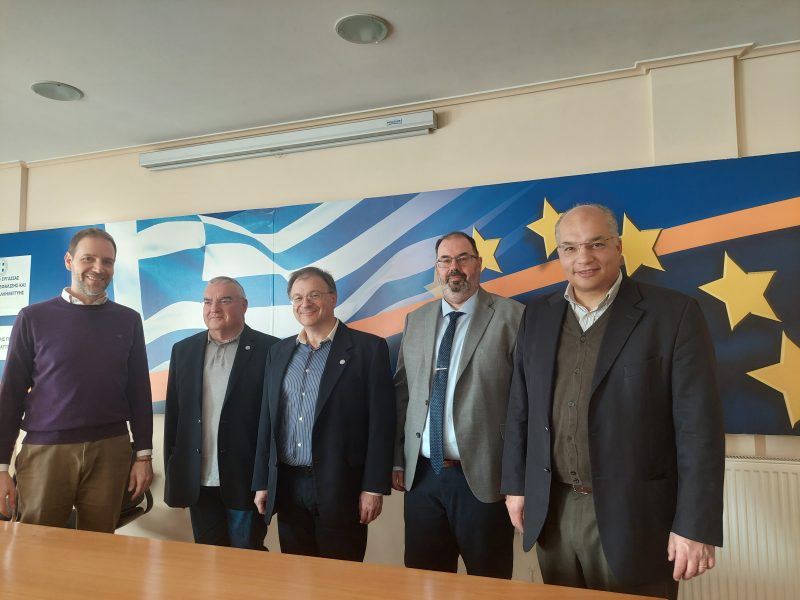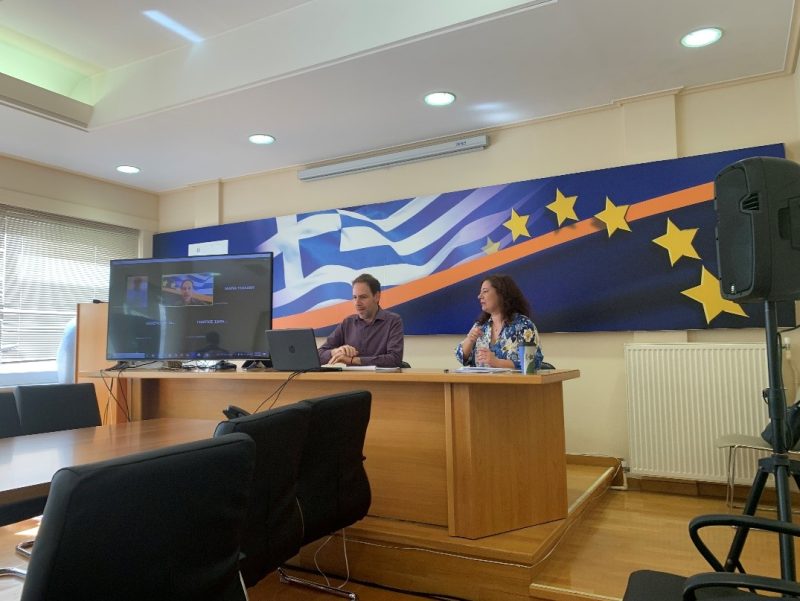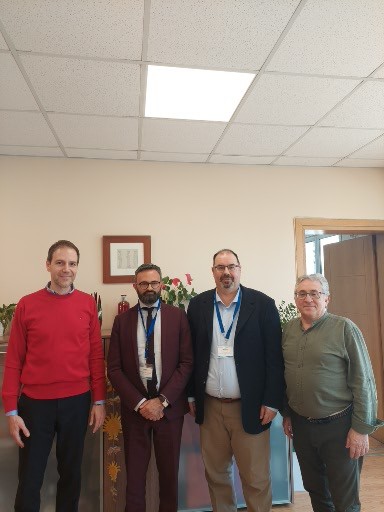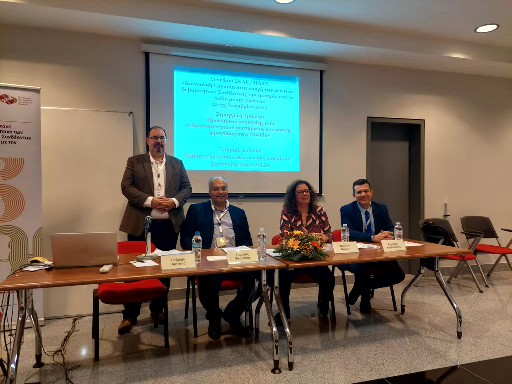Flagship Research Project
‘Evidence based tools on EU funding of Social Services – Research analysis for the use of the EU financial instruments in the social care sector’
Introduction
The Social Administration Research Laboratory at the University of West Attica (SARL UNIWA) was assigned by the Regional Social Welfare Centre of Attica (RSWCA, the biggest public provider of care services in Grece) to provide capacity building and research services to strengthen its ability to use EU funding instruments for social care investments. The Project took place during 2024 in the area of the Attica Region (the biggest administrative region of Greece that encompasses the entire Athens metropolitan area, the core city of which is the country’s capital and largest city, Athens) and was completed on November 2024.
The RSWCA supervisory team has accepted the key project recommendations and is currently ready to submit proposals to the Greek authorities and the European Commission taking into account relevant strategic priorities and eligibility conditions of:
- the European Regional Development Fund (ERDF) Regulation;
- the European Social Fund Plus (ESF+) Regulation;
- the Just Transition Fund (JTF) Regulation
- the Interreg Regulation;
- the Recovery and Resilience Facility Regulation.
Project rationale
Greece is the EU Member State most impacted by the 2009 financial crisis, given that there were neither primary social safety nets for those unable to meet their needs through market or family settings, nor effective social security policies in case of specific risks, as old age, disability and dependency. Seven years after the conclusion of the Third Economic Adjustment Programme in 2018, Greece remains one of the few EU Member States without a sustainable national social care regime. There is not any regulated national funding instrument to guarantee a balanced approach between supply and increasing demand for social services, while the social security system has not introduced any guarantee against the dependency risk.
In this regard, it is no surprise that Greece ranks in the twenty first place between EU 27 with a 1.3% of GDP spent on family/children benefits (EU 27 average: 2.4%) and in the twenty first place between EU 27 with 5.2 % of total expenditure on social benefits devoted to family/children benefits (EU 27 average: 8.3%). In addition, Greece and Cyprus are the EU Member States with the worst performance on average expenditure on family/children benefits {one thousand five hundred and eighty (1.580) Purchasing Power Standards per child for Greece and one thousand five hundred and seventy (1.570) Purchasing Power Standards per child for Cyprus), while the EU 27 average was four thousand two hundred and ninety one (4.291) PPS.
Last but not least. Greece has the lowest rate (below 10%) at the EU level in the composition of expenditures on family/children benefits in kind (they represent the hard core of social services, such as child day care; accommodation and home help) within the overall expenditures on family/children benefits – EU 27 average: 38.5%). In addition, Greece has also the lowest rate (0.2%) at the OECD level in the total long-term care spending as a share of GDP – OECD 31 average: 1.8% (https://www.oecd-ilibrary.org/social-issues-migration-health/health-at-a-glance-2023_36e18bb7-en).
In this challenging context, Greece depends disproportionally to other EU Member States on EU financial instruments that may support the development of social care services in line with strict eligibility conditions of the European Investment and Structural Funds. But access to these EU instruments is very problematic for the majority of public care providers due to lack of expertise, bureaucratic constraints, weaknesses to design evidence-based funding proposals according to users’ needs and policy issues to put forward supportive action plans.
In this regard, the Social Administration Research Laboratory at the University of West Attica (SARL UNIWA) was assigned by the Regional Social Welfare Centre of Attica (RSWCA, the biggest public provider of care services in Grece, a legal body of public law supervised by the Ministry of Social Cohesion and Family) to provide capacity building and research services to strengthen its ability to use EU funding instruments in the field of social care. The Project was funded by the RSWCA budget (research budget line).
Project partners
(a) The Social Administration Research Laboratory at the University of West Attica (SARL UNIWA, https://sarl.uniwa.gr/en/homepage/) is the leading Greek centre of academic excellence in the sector of social policy and administration through the creation of an interdisciplinary community of research scholars, practitioners and policymakers. It promotes sound (national and comparative) research and teaching agendas at graduate, post-graduate, PhD and postdoctoral level related to different aspects of the Welfare State, including health and social care, social welfare and inclusion, pensions, employment, housing and migration. Members of the Laboratory have carried out since the 1990s more than 150 international and national multidisciplinary research and capacity building assignments focused on different thematic agendas: social insurance, social welfare, social inclusion, health care and mental health, social care, employment, education, social economy and social entrepreneurship, social housing.
SARL UNIWA is a member of prestigious International Networks active in the thematic areas of social law and policy, such as the European Social Network (https://www.esn-eu.org/our-members#/members-directory), the Academics Stand Against Poverty Network (https://academicsstand.org/) and HOUSING EUROPE – The European Federation of Public Cooperative and Social Housing (http://www.housingeurope.eu).
SARL UNIWA has carried out during 2020-2025 the following flagship projects in the thematic area of social services.
| Title of Project | Short Description |
| EU EaSI Project “Social Services Index” (2024-2025) | SARL UNIWA was assigned by the European Social Network to compile the Social Services Index for Greece; this is the first comprehensive study about the regulatory, policy and funding framework of social care services (including LTC) in Greece |
| Project ‘Support to the Regional Social Welfare Centre of Attica for the use of EU financial instruments’ (2024) | SARL UNIWA provided to the Regional Social Welfare Centre of Attica (supervised by the Greek Ministry of Social Cohesion and Family) capacity building and research services to strengthen its ability to use EU financial instruments in the field of social care |
| Project ‘Methodologies and tools for the identification of health care needs at the regional level’ (2022-2023) | SARL UNIWA was assigned by the Greek Ministry of Health to compile a multidimensional study on the identification of health care (including LTC) needs at the regional level by creating and applying a concerted methodological plan with tools, indices and indicators |
| Project ‘Resilient Western Athens 2030 – Update of the SoUP, evaluation of deficiencies, highlighting the needs of immediate interventions and proposals for the development of a Resilience Strategy of Western Athens’ (2022-2023) |
SARL UNIWA was assigned by the Region of Attica to compile the social aspects of the Resilience Strategy of the Western Athens Functional Area, including proposals about the reform of regional and local social services (including LTC)
|
|
Project “Comparative Survey on the local social care regimes in Europe” (2022)
|
SARL UNIWA was assigned by the Hellenic Agency for Local Development and Local Government to compile a comparative study about the regulatory and administrative framework of local social care services (including LTC) in Europe |
| Project ‘Review of Measures to Address Child Poverty and Social Exclusion in Greece – Undertaking a deep dive analysis of policies, programmes, services, budgets, and mechanisms addressing child poverty and social exclusion in Greece’ (2021-2022) | SARL UNIWA was assigned by the UNICEF Greece Country Office to study and propose new national policies to prevent and combat children poverty in Greece |
| Project “The National Social Inclusion Strategy for the Roma population 2021-2030” (2020-2022) | SARL UNIWA was assigned by the Greek Ministry of Labour and Social Affairs to draft The National Social Inclusion Strategy for the Roma population and its Action Plan |
(b) The Regional Social Welfare Centre of Attica (RSWCA, https://www.kkppa.gr/) is the biggest public provider of care services in Greece; it is a legal body of public law supervised by the Ministry of Social Cohesion and Family Affairs. Its tasks concern the organization and provision of social care services, with emphasis on open (counseling, psychological and social support for children and families) and residential care for children, disabled and the elderly. RSWCA is a member of the European Social Network – https://www.esn-eu.org/our-members#/members-directory.
The Regional Social Welfare Centre of Attica is located at the centre of Athens and provides open care and residential services through five branches (regional agencies without an independent legal personality):
- the Residential Care Unit of Eastern Athens
- the Residential Care Unit of West Athens
- the Rehabilitation and Rehabilitation Branch of Children with Disabilities of Voula
- the Child Protection Branch of Attica “MITERA”
- the open care Child Development Center of Attica “MICHALINEIO”.
(c) The Ministry of Social Cohesion and Family Affairs (MoSCF, https://minscfa.gov.gr/en/ministry/) is the competent government body for social care services in Greece according to the Law No. 2646/1998 “Development of the National Social Care System and other provisions”. It supervises the following social care providers:
- 12 public bodies called Regional Social Welfare Centers that provide long-term care and alternative care for children without families
- a public body called National Center for Social Solidarity that provides social emergency care services (ex. shelters for people in crisis)
- a number of certified private non-for-profit providers specializing both in open social care services and residential care.
Project Launch

Launching of SARL UNIWA Flagship Project | ‘Evidence based tools on EU funding of Social Services – Research analysis for the use of the EU financial instruments in the social care sector’ |
Project scope
(a) This Project is the first ever research initiative in Greece about the financial sustainability of public (open and residential) care services through EU instruments. It was performed as a cross-sector collaboration between the biggest public provider of care services (RSWCA) and the leading centre of academic excellence in the social policy sector (SARL UNIWA).
(b) Taking into account the scope of the key EU funding instruments (the Cohesion Policy 2021-2027 and the Recovery and Resilience Facility 2021-2026) and the policy recommendations of EU soft law (the European Pillar of Social Rights, the EU Care Strategy and the Long-Term Care Recommendation), the Project fulfilled through a co-production method its two key objectives:
- to provide scientific support to the Centre for identifying, monitoring and exploiting EU funding opportunities that will advance its role and improve the quality of its services;
- to upgrade the skills of the Centre executives and advance their capabilities to use EU funding opportunities.
(c) The Project’s scope addresses a serious grey area about the use of EU funding instruments as a means to support the delivery of public (open and residential) care services (ie. the limited eligibility of social investments); in this regard, the Project concluded that the eligibility of activities in the social services sector is not a politically driven decision by national or regional policy makers but an operational condition of EU hard law (Regulations) that should be fully respected by all stakeholders.
(d) The Project’s deliverables could be used as a European benchmarking framework for checking the legal and operational eligibility of social care investments by public entities which are interested to take advantage of available EU funding; in this regard, the Project contributes to evidence-based policy options of public care providers, ensuring that their decisions are rooted in robust regulatory data.
Project Teams
(a) The SARL UNIWA research team included first rank professors (disciplines: Social Security Law; Health and Social Care Management; Welfare State Economics), senior experts (disciplines: Social Care Law; EU law, EU project management) and PhD researchers (disciplines: Health and Social Care Management; Social Services Human Resources).
Project Lead was Dr. Gabriel Amitsis (ORCID ID: 0000-0002-3344-4770), first rank Professor of Social Security Law in the Department of Business Administration (Social Policy Unit) and Director of SARL UNIWA; Project Manager was Ms. Fotini Marini (ORCID ID: https://orcid.org/0000-0002-5579-2100), PhD in social care law, acting currently as the Head of the Social Welfare and Inclusion Hub at SARL UNIWA.
(b) The RSWCA supervisory team included the President Ioannis Livanos, the General Director George Deligiannis, members of the Financial Department and the Coordinators of the five branches.
(c) The RSWCA focus groups included staff of the central service and the five branches (disciplines: social work, social policy and administration, public management, primary health care, medicine, nursing, physiotherapy and occupational therapy, geriatricians and rehabilitation services).
Project target groups
(a) The key policy target groups of the research agenda are social policy makers and senior managers at the central, regional and local level who are interested in identifying and using EU funding instruments to promote reforms by introducing new services or strengthening the sustainability of existing public (open and residential) care regimes.
(b) The key administrative target groups of the research agenda are Social Services Directors and Managers of public (open and residential) care providers who are interested in identifying and using EU funding instruments in the field of social care.
(c) The key beneficiary groups of the research agenda are claimants and users of existing public (open and residential) care services.
(d) The key anticipated beneficiary groups of the research agenda are people in need of social services who could not be covered by the existing public (open and residential) care services.
Seminar for RSWCA staff

The seminar implemented for RSWCA’s staff
Research methodologies and tools
The Project adopted a highly ambitious research agenda that satisfies the conditions for developing large scientific impact in the very complex field of sustainable social care services. The research focused on a more or less underdeveloped area from a comparative point of view, namely the use of EU funding instruments to support the delivery of quality public (open and residential) care services. The Project Team applied the traditional legal research method (which involves analyzing and interpreting relevant EU legislation, case law and legal doctrine about funding instruments) and qualitative research methods (an online survey using a structured questionnaire format / three focus groups with RSWCA staff to identify users’ needs and expectations).
Both methods were used to understand the regulatory and operational routes to take advantage of various EU funding instruments as a means to support public providers of care services to children, people with a disability and the elderly. This is truly innovative and original, as current relevant research about services funding is mostly focused on public instruments (taxation) or users’ fees, while many scholars are skeptical to suggest the use of EU funding instruments in the field of social care due to hidden eligibility issues or management constraints.
ESN visit to the Project site

Athens, June 2024
Project Deliverables
(a) The Project was performed in line with the assignment conditions and delivered a set of practical suggestions to support the RSWCA financial sustainability through:
- the establishment of an EU Programmes Unit;
- the direct financial assistance from the Hellenic National Recovery and Resilience Plan 2021-2026 (NRRP);
- the medium-term financial assistance from the EU Technical Support Instrument (TSI);
- the long-term financial assistance from the Hellenic National Support Framework 2021-2027 (Cohesion Policy Programme under shared management).
(b) Key Project deliverables are three user friendly Guides (in Greek) that provide a practical means to improve the quality of public social care services by using available EU funding instruments during the 2021-2027 period:
- the first Guide identifies and analyses all funding opportunities for social care investments by public beneficiaries through the use of direct grants by Cohesion Policy Programmes under shared management (Member States and the European Commission);
- the second Guide identifies and analyses all funding opportunities for social care investments by public beneficiaries through the use of direct grants by Cohesion Policy Programmes under European Commission’s direct management (the Programme for Employment and Social Innovation; the Erasmus+ Programme; the European Territorial Cooperation Objective INTERREG Programmes; the URBACT Programme; the European Urban Initiative; the Horizon Europe Programme; the EU Single Market Programme; the Programme “Citizens, Equality, Rights and Values”, the Asylum, Migration and Integration Fund Programmes and the Technical Support Instrument);
- the third Guide identifies and analyses all funding opportunities for social care investments by public beneficiaries through the use of direct grants by the Recovery and Resilience Facility (using the Greek National Recovery and Resilience Plan as a case study).
(c) Although these Guides are more or less adapted to the specific Greek social care framework (particularly related to the needs of the RSWCA organization), they could serve as a benchmarking framework for checking the legal and operational eligibility of social care investments by public entities which are interested to take advantage of available EU funding instruments during the 2021-2027 period.
(d) The advantages of using EU funding instruments are obvious in case of public entities with limited operational capacity (number of employees and infrastructure) and financial sustainability. This is evidenced particularly in the Mediterranean South and Eastern Europe countries, as laid down in the recent report of the ESN EaSI Project “Social Services Index” (https://www.esn-eu.org/publications/esn-social-services-index-2024-cross-country-analysis) and the Council Recommendation of 8 December 2022 on access to affordable high-quality long-term care (https://eur-lex.europa.eu/legal-content/EN/TXT/?uri=oj:JOC_2022_476_R_0001).
Athens International Conference

Athens, November 2024
Dissemination activities
Project preliminary and final results were presented so far in various events in Greece and abroad, including:
- the 32nd European Social Services Conference “Co-creating Future Social Services” (Organization: European Social Network, Antwerp, 26-28.6.2024)
- the 7th International Conference on Evidence-based Policy in Long-term Care (Organization: International Long-Term Care Network, Bilbao, 12-14.9.2024)
- the 2024 EASPD International Conference (Organization: The European Association of Service providers for Persons with Disabilities / The NET, Athens, 17-18.10.2024)
- the International Conference “Social Work in the Age of Fluid Certainties: Linking Experience from the Field with Research” (Organization: Association of Social Workers of Greece, Athens, 22-23.11.2024).


